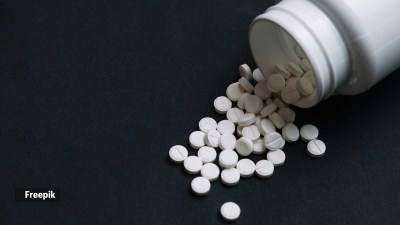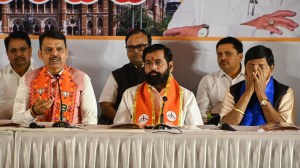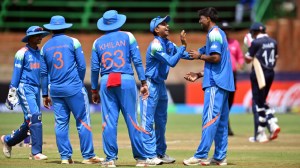Cong, PDP find common ground
Having conceded the Chief Minister8217;s job to the People8217;s Democratic Party in Jammu and Kashmir, the Congress walked the tightrope ...

Having conceded the Chief Minister8217;s job to the People8217;s Democratic Party in Jammu and Kashmir, the Congress walked the tightrope for evolving a Common Minimum Programme CMP for the coalition that was announced today.
After spending a week in thrashing out a mutually acceptable CMP, the Congress today stressed that there were no major differences between the stated objectives of the two parties, granting the PDP most of its demands mentioned in its manifesto. However, reading between the lines, one could see how the Congress had not just played along but toned down some points.
|
8216;Healing
physical, psychological and emotional wounds8217; |
| Militants: Encourage those willing to return and cooperate with Centre to fight cross-border terrorism; schemes to rehabilitate former militants who join mainstream Talks: Centre should hold unconditional talks with legislators and other segments of public opinion POTA: Not to be implemented, review POTA cases SOG: Special Operations Group to be assimilated,relocated within police establishment Human rights: Probe custodial killings, human rights violations; review cases of detainees held without trial, release all detainees held on non-specific charges or not charged with serious crimes Victims of Militancy: Relief and rehabilitation package for families affected by militant violence 8216;Ehtisab8217;: Establish an institution for probing complaints received against CM, ministers, MLAs Development: To set up Autonomous Hill Council for Kargil; State Finance Commission; Minority Commission; Delimitation Commission |
Instead of the demand for holding talks with militants 8212; which the PDP had voiced during its campaigning 8212; the CMP says the Centre should hold unconditional talks with the newly-elected MLAs and 8216;8216;other segments of the public opinion8217;8217; for restoration of 8216;8216;peace with honour8217;8217; in the state.
However, the CMP promises all possible measures to 8216;8216;encourage those young men from the state who have resorted to militancy to return to their families and the mainstream.8217;8217; Senior leader Arjun Singh, who was one of the architects of the programme, pointed out, 8216;8216;We solved the Khalistan issue in Punjab by solving every small problem of the region. It is only by talking that one gets to know what are the questions that are to be answered and not by abandoning and running away.8217;8217;
The PDP8217;s demand for winding up the Special Operations Group SOG has been incorporated though Mufti preferred to call it 8216;8216;reorientation of SOG8217;8217;. The CMP states the coalition would ensure that 8216;8216;the personnel of SOG are assimilated/relocated within the regular police establishment8217;8217;.
However, the PDP8217;s manifesto promise that a commission of inquiry would be set up to look 8216;8216;into the allegations against the SOG/security forces relating to disappearance/custodial killings8217;8217; doesn8217;t figure in the CMP.
The agreement on not implementing POTA was easy to arrive at since that has been the Congress stand in other states too. However, Mufti went a little further and said, 8216;8216;All political prisoners will be screened and released. Why should we keep our people in prison? We shall not implement POTA and we will review the cases of those who have been arrested under POTA.8217;8217;
The prisoners to be released include those 8216;8216;not charged with serious crimes8217;8217; and those who have been imprisoned for a period longer than their possible sentence.
The PDP8217;s promises to the families of slain militants find an echo in the determination to 8216;8216;reach out to the children, widows and parents of the deceased militants8217;8217;. This is balanced by the promise of a relief package for 8216;8216;families affected by militant violence8217;8217;.
Clarifying his stand, Mufti said, 8216;8216;Without discrimination, we will take care of the welfare of both families of the militants and also those of the victims, especially by providing education.8217;8217;
The PDP manifesto talked about making Kashmir 8216;8216;a brigde between the people of the two countries India and Pakistan8217;8217; by charting a new course. Today, shirking from the issue of holding a dialogue with Pakistan, Mufti said, 8216;8216;Talks with Pakistan are for the Centre to decide. This agenda is for the government of J-K.8217;8217;
Explaining the exercise, JKPCC chief Ghulam Nabi Azad said, 8216;8216;A party manifesto is drawn up believing that the party will get a majority. But in a coalition, a working arrangement has to be made and the manifesto has to be altered.8217;8217;
Expressing his gratitude to Sonia Gandhi, Mufti said, 8216;8216;Congress is in power in 14 states and the Congress president was under tremendous pressure. But rising above partisan interest or party interests, she has taken a historic decision.8217;8217;
The PDP-Congress and other allies will stake claim to form a government in J-K that8217;s expected to take oath in Srinagar before November 2. While Mufti will be remain Chief Minister for three years, followed by a Congress chief minister, the post of deputy chief minister, assembly speaker and chairman of the coordination committee will be claimed by the Congress.
According to the PDP leaders, the date for the swearing-in ceremony will be decided according to the 8216;8216;convenience8217;8217; of the Congress president who has been invited.
- 01
- 02
- 03
- 04
- 05































